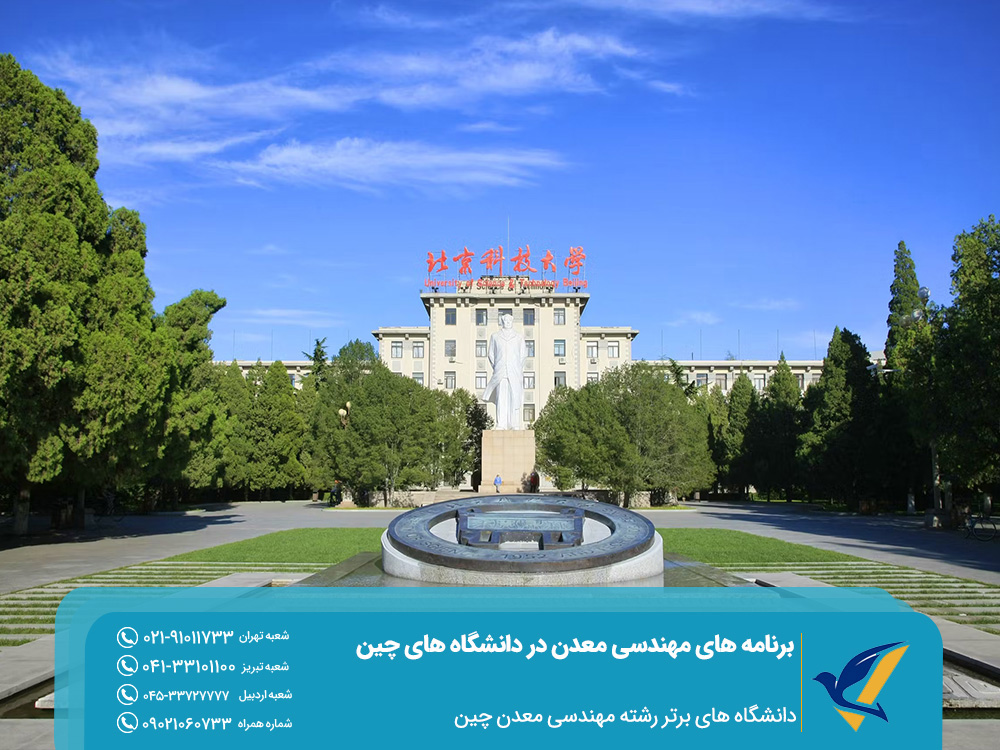Studying Mining Engineering Programs at Chinese Universities
In recent years, mining engineering programs at Chinese universities have attracted a large number of students. As a global leader in mineral production and resource development, China has established itself as a powerhouse in mining engineering education, combining advanced technology with a rich natural heritage. With the growing global demand for sustainable resource extraction, China’s top mining engineering universities equip students with the skills to tackle modern industry challenges.
These programs combine rigorous academic training, advanced research opportunities, and practical experience, often supported through partnerships with China’s thriving mining sector. Academic credentials from Chinese higher education institutions are internationally recognized, preparing graduates for careers in this booming industry. In this article from Elm Vira’s science series, join us as we explore the cost of studying mining engineering in China.
Benefits of Studying Mining Engineering Programs at Chinese Universities
Studying mining engineering programs in China offers numerous advantages, making it an attractive choice for students aiming to excel in a vital global industry. China’s position as a leading producer of minerals such as coal, rare earth elements, and metals underpins its strong mining engineering programs, which blend academic rigor, hands-on training, and global connections. Below, we review the benefits of studying mining engineering in China.

-
Access to Advanced Facilities
One of the standout advantages of studying mining engineering programs at Chinese universities is unparalleled access to advanced facilities and industry integration. Universities such as China University of Mining and Technology (CUMT) and Central South University feature cutting-edge laboratories that simulate real-world mining environments—from underground tunneling to mineral processing—for students.
These institutions maintain strong relationships with Chinese mining technology giants like Shenhua Group and China National Coal Group, offering students internships, site visits, and joint project opportunities. This ensures graduates are job-ready with practical skills aligned with industry needs.
-
International Academic Excellence
Mining engineering programs in Chinese universities are internationally recognized for their academic excellence. Many of these programs, offered by top universities like CUMT and Beijing University of Science and Technology, are accredited under the Washington Accord, guaranteeing that student degrees meet international standards and are highly valued worldwide.
Curricula emphasize modern challenges such as sustainable mining, automation, and environmental management, preparing students to address critical global issues. The field often integrates advanced technologies like AI-based mining into the curriculum.
-
Affordability of Studying Mining Engineering in China
The affordability of mining engineering education in China is another major advantage for interested students. Compared to Western countries, tuition fees in China are relatively low, typically ranging from $2,000 to $5,000 per year. Scholarships such as the Chinese Government Scholarship and specific university grants reduce the financial burden on students. The affordability of mining engineering programs in China makes studying in a unique educational environment accessible to a wide range of students.

-
Cultural and Career Opportunities
Another advantage of studying mining engineering programs at Chinese universities is the rich cultural and career opportunities. Studying in China immerses students in a vibrant cultural landscape, enhancing their global perspectives and language skills. Learning Mandarin is a unique asset in international business. China’s vast industry offers significant benefits for understanding global supply chains, as the country dominates critical mineral markets such as lithium and cobalt, which are essential for renewable energy technologies. Graduates often find employment not only in China but also in multinational companies worldwide.
-
Mining Engineering Programs in Chinese Universities; International Collaborations
In addition to the above benefits, top mining engineering universities in China prioritize international collaborations, hosting exchange programs and research partnerships with institutions in Australia, Canada, and Europe. This extensive global network exposes students to expanding professional connections and enhances their career prospects. Faculty members in mining engineering programs at Chinese universities often include pioneers and researchers who contribute to advancements in mine safety and environmentally sustainable practices. These professors provide guidance that links theory with practical application.
-
Dynamic Educational Environment
Finally, China’s rapid urbanization and modern infrastructure create a dynamic learning environment. Students witness firsthand the intersection of mining, engineering, and sustainable development. By studying mining engineering programs in Chinese universities, students benefit from a unique ecosystem of innovation, affordability, and future opportunities.
Conditions for Studying Mining Engineering Programs in Chinese Universities
The eligibility requirements and criteria for studying mining engineering programs in Chinese universities depend on various factors. Students seeking to study mining engineering in China must meet the academic qualifications, language skills, age limits, and other regulations set by the government and universities. These criteria ensure that international students are well-prepared for the rigorous demands of mining engineering programs that combine theoretical knowledge with practical applications in a globally important industry. Next, we will review the conditions for studying electrical engineering in China.

-
Academic Requirements
To study mining engineering programs at Chinese universities at the undergraduate level, international students must present a high school diploma or its equivalent. Strong grades in subjects such as mathematics, physics, and chemistry can increase students’ chances of admission, as these subjects form the foundation of mining engineering. Some of China’s top mining engineering universities have GPA requirements, typically accepting a minimum GPA of 17 to 18 (on a 20-point scale).
Studying mining engineering at the graduate level in China requires a relevant bachelor’s degree and excellent academic performance. Having documents such as recommendation letters, a statement of purpose, and a resume can improve students’ chances of acceptance.
-
Language Skills
Mining engineering programs in Chinese universities are offered in Chinese or English. International students must provide language proficiency certificates depending on the language of their chosen program. For programs taught in Chinese, students must submit an HSK certificate (at least level 4 or higher). For programs taught in English, students must demonstrate their proficiency through international exams such as IELTS or TOEFL. The minimum accepted scores vary by university. Some universities offer preparatory language courses for students who do not yet have the required language certification.
-
Age and Health Requirements for Studying Mining Engineering Programs in Chinese Universities
The Chinese government enforces age limits for applicants to the country’s higher education system. International students must be under 25 years old for undergraduate studies, under 35 for master’s programs, and under 40 for doctoral studies. However, exceptions may be made for scholarship recipients. Applicants to mining engineering programs in China must have good physical and mental health and provide a certified health certificate. This certificate ensures that students are physically capable of meeting the demands of fieldwork in mining engineering.

4. Application Process and Required Documents
The application process for admission to mining engineering programs at Chinese universities is conducted online through the official website of the respective university. Students must submit their applications along with the required documents by the deadlines set by the universities. The necessary documents for application typically include:
- Valid passport
- High school diploma
- Academic transcripts
- Language proficiency certificate
- Health certificate
- Proof of financial ability
- Statement of purpose (motivation letter)
- Recommendation letters
- Resume/CV
- Other relevant documents
Tuition Fees for Mining Engineering in China
The tuition fees for mining engineering programs at Chinese universities are very affordable compared to the United States and Europe. China offers a quality education at reasonable costs for students. The tuition fees depend on various factors, which are broken down below:
- Tuition Fees
For undergraduate mining engineering programs in China, tuition fees range from approximately $2,000 to $5,000 per year. Reputable institutions like China University of Mining and Technology typically charge about $2,500 to $3,500 annually, while higher-tier universities such as Central South University may charge $4,000 to $5,000 per year.
Graduate-level tuition fees are higher, ranging from $3,000 to $6,000 per year. Programs taught in English often have higher fees. These costs cover access to advanced facilities such as mining simulation laboratories, making studying in China an excellent option.
- Living Expenses
Living expenses form a significant portion of the overall cost of studying in China. On-campus student dormitories are very affordable, costing between $300 and $1,200 per year depending on room type and facilities. Shared dormitory rooms with basic amenities typically cost $300 to $600 per year.
Single rooms or rented apartments off-campus can be more expensive, ranging from $800 to $1,200 per month. Monthly living costs for food, transportation, and personal expenses vary depending on lifestyle and city, ranging roughly from $200 to $400 per month. Smaller cities tend to have lower living costs. Annual living expenses are estimated between $2,400 and $4,800.
- Scholarships
- Scholarships such as the Chinese Government Scholarship can cover all or part of tuition, and dormitory fees, and provide additional allowances. Receiving such scholarships can significantly reduce the financial burden on students. Overall, the total annual cost of studying mining engineering in China, including living expenses, can range from $5,000 to $10,000 depending on various factors.

Top Mining Engineering Universities in China
China hosts several top-ranked universities renowned for their advanced facilities, strong industry partnerships, and internationally recognized programs in mining engineering. These universities lead globally with cutting-edge laboratories, including mine ventilation simulators, rock mechanics labs, and more, which significantly enhance practical training. Their collaboration with major mining companies provides students with valuable exposure to real-world industry practices.
The leading mining engineering universities in China are equipped with state-of-the-art mineral processing facilities and research centers focused on sustainable mining technologies. Accredited under the Washington Accord, these institutions offer fieldwork, AI-based mining systems, and safety training, ensuring graduates are well-prepared for global careers in mining engineering. Some of the best universities for mining engineering programs in China include:
- China University of Mining and Technology
- Central South University
- Beijing University of Science and Technology
- Wuhan University
- Nanjing University
- Shandong University
- Chongqing University
- …and others
Conclusion
Mining engineering programs at Chinese universities present an excellent opportunity for students eager to advance in this vital global industry. These programs offer a unique combination of academic excellence, modern technologies, and affordability. China’s top mining engineering universities equip students with the skills needed to tackle modern challenges—from sustainable resource extraction to advanced automation—through world-class facilities and industry partnerships.
With globally recognized degrees, accessible tuition fees, and generous scholarships, these institutions provide an unparalleled chance for international students to gain hands-on expertise in one of the world’s mining powerhouses. This article aims to cover everything you need to know about studying mining engineering in China, including admission requirements and costs. If you are interested in pursuing educational migration to China, get a free consultation from us and secure guaranteed admission to your preferred university.
میانگین امتیازات 5 از 5
Vote count: 1 Vote